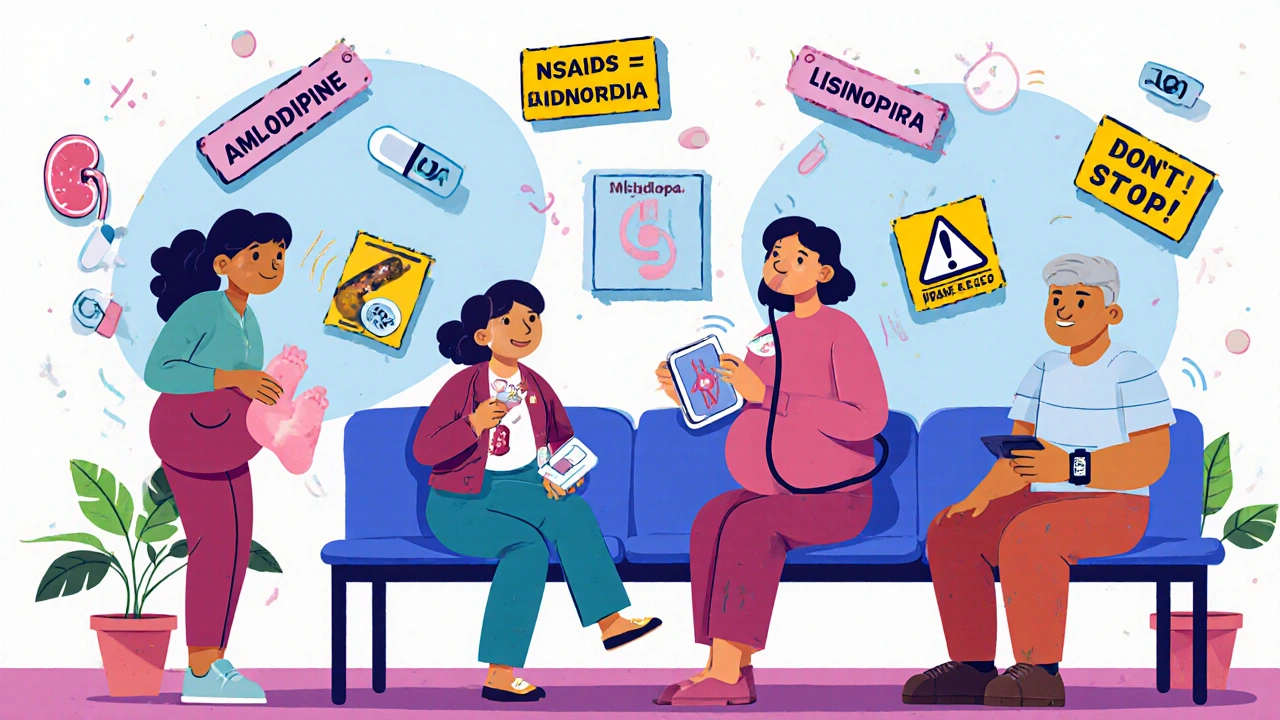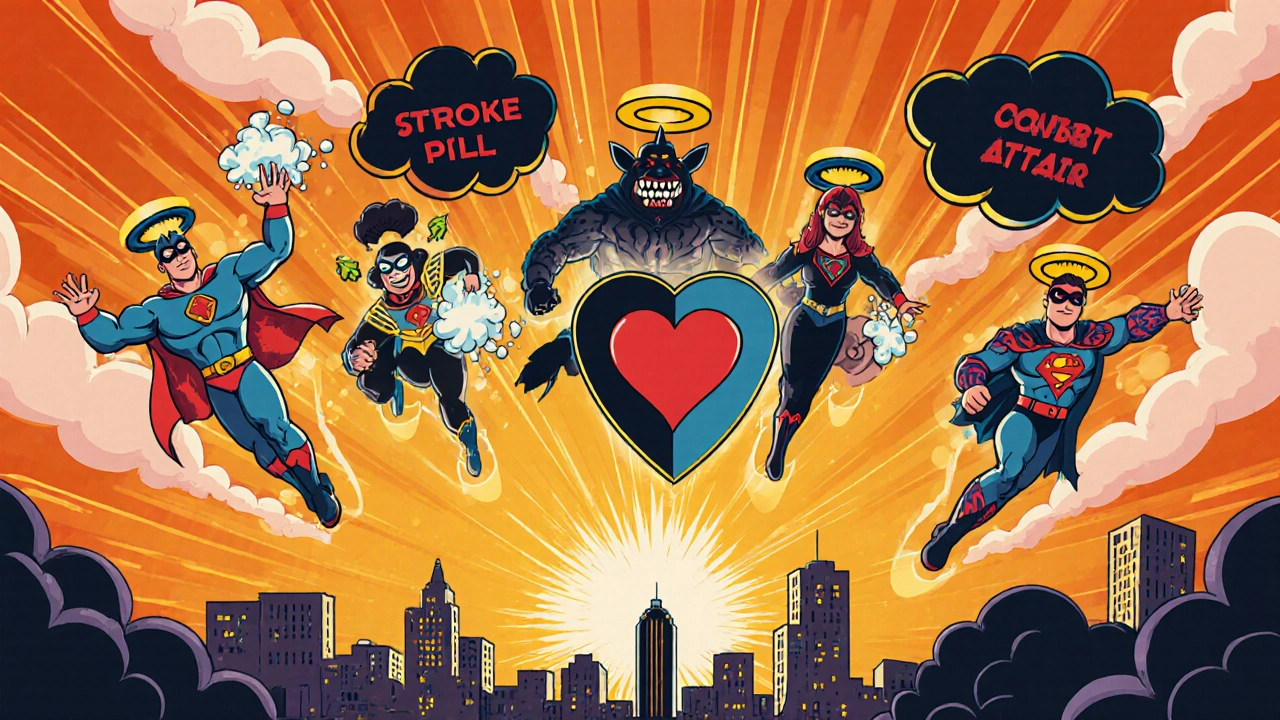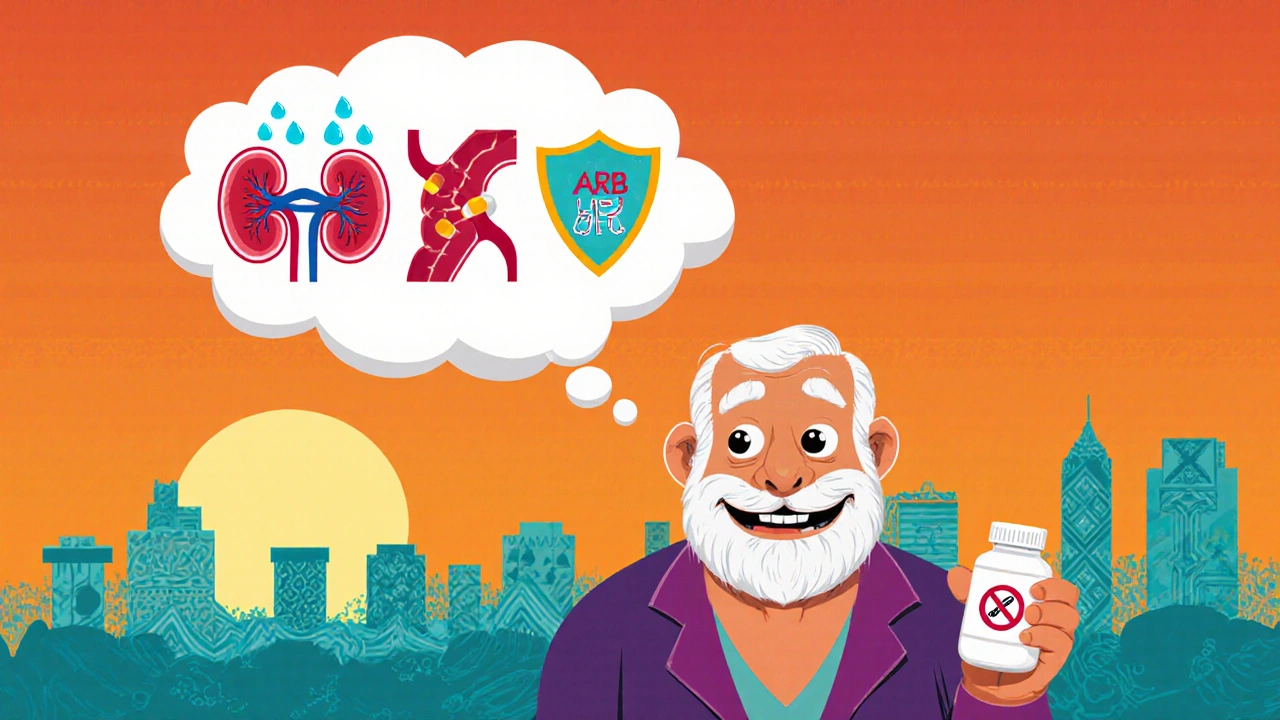High blood pressure doesn’t come with warning signs. You might feel fine, but your arteries are under constant strain. Left unchecked, it can lead to heart attack, stroke, or kidney failure. That’s why millions of people take blood pressure medications every day - not because they’re sick, but because they need to stay that way. The right pill can be life-saving. The wrong one? It might make things worse.
How Blood Pressure Medications Work
Blood pressure meds don’t just lower numbers. They target how your body controls pressure - through your heart, blood vessels, kidneys, and nerves. There are ten main classes, each with a different job. Some make your heart beat slower. Others relax your arteries. Some tell your kidneys to flush out extra salt and water.
Doctors don’t pick these randomly. They look at your age, race, other health issues, and even how your body reacts to certain drugs. For example, if you’re Black, thiazide diuretics or calcium channel blockers often work better than ACE inhibitors. If you have diabetes or kidney disease, ACE inhibitors or ARBs are preferred because they protect your kidneys. If you’ve had a heart attack, beta-blockers help your heart heal.
Common Blood Pressure Medication Classes
- Thiazide diuretics - Like hydrochlorothiazide. They help your body get rid of extra salt and water. This reduces blood volume, which lowers pressure. Often the first choice for new patients.
- Beta-blockers - Such as metoprolol and propranolol. They slow your heart rate and reduce how hard your heart pumps. Used mostly when there’s heart disease, after a heart attack, or if you have anxiety-related spikes.
- ACE inhibitors - Lisinopril is the most common. They block a chemical that narrows blood vessels. Great for people with diabetes, heart failure, or kidney disease. But they can cause a dry, annoying cough in 10-20% of users.
- ARBs - Losartan and valsartan. These do what ACE inhibitors do but without the cough. Often used if you can’t tolerate ACE inhibitors. Still risky in pregnancy.
- Calcium channel blockers - Amlodipine is the top pick. They relax blood vessels. Dihydropyridines like amlodipine are best for high blood pressure. Non-dihydropyridines like verapamil affect the heart more and are used for rhythm problems.
- Alpha-blockers - Doxazosin, prazosin. They stop nerves from tightening blood vessels. Less common now, but helpful for men with enlarged prostates.
- Alpha-2 agonists - Clonidine and methyldopa. Work in the brain to calm the nervous system. Used in pregnancy or when other drugs fail.
- Direct renin inhibitors - Aliskiren. Rarely used. Expensive and not much better than ACE inhibitors or ARBs.
- Vasodilators - Hydralazine, minoxidil. Used only in severe or resistant cases. Can cause serious side effects like rapid heartbeat.
- Aldosterone antagonists - Spironolactone. Used when other drugs aren’t enough, especially in heart failure. Can raise potassium levels dangerously.
Side Effects You Can’t Ignore
Most people think side effects are just a nuisance. But some can be dangerous - and they’re often ignored until it’s too late.
Diuretics can drop your potassium too low, leading to muscle cramps or irregular heartbeat. They can also trigger gout flare-ups. Beta-blockers might make you feel tired, cold, or depressed. For diabetics, they can hide the warning signs of low blood sugar - like shaking or sweating - which is risky.
ACE inhibitors cause that persistent cough in a lot of people. It’s not dangerous, but it’s enough to make some quit taking the pill. ARBs avoid this, but they still carry a risk of high potassium, especially if you have kidney problems.
Calcium channel blockers like amlodipine often cause swollen ankles, dizziness, or headaches. Some people get gum overgrowth - your gums swell and bleed. It’s rare, but it happens. Verapamil can cause severe constipation.
Alpha-blockers can make you dizzy when you stand up - orthostatic hypotension. This increases fall risk, especially in older adults. Methyldopa, often used in pregnancy, can cause liver issues or depression.
And then there’s the big one: combining ACE inhibitors and ARBs. It sounds logical - double the effect. But studies show it increases kidney damage and high potassium without better results. The FDA warns against it.

Safety Rules: What to Avoid
Some drugs don’t mix. Taking an NSAID like ibuprofen or naproxen with an ACE inhibitor can suddenly wreck your kidneys. Even occasional use can be risky. If you’re on blood pressure meds, always check with your doctor before taking painkillers.
Pregnancy changes everything. ACE inhibitors, ARBs, and direct renin inhibitors can cause serious birth defects. They’re banned during pregnancy. Safe options? Methyldopa and labetalol. These have decades of safe use.
Older adults are more sensitive. A dose that’s fine for a 40-year-old might knock an 80-year-old off their feet. Doctors should start low and go slow. Regular checks for dizziness, confusion, or falls are essential.
Don’t stop your meds just because you feel fine. High blood pressure doesn’t go away when you stop taking the pill - it comes back. And it’s often worse. About half of people quit their meds within a year. The reason? They don’t feel sick. But the damage is still happening.
When You Need More Than One Pill
One pill isn’t enough for most people. About 70% of patients need two or more drugs to reach their target. That’s normal. It doesn’t mean your condition is worse - it means your body needs help from multiple angles.
Current guidelines say if your blood pressure is above 140/90, start with two drugs right away. Common combos: a diuretic plus an ACE inhibitor. Or a calcium channel blocker plus an ARB. These pairs work well together and often come in one pill, making it easier to remember.
Combination pills reduce the number of tablets you take. That boosts adherence. If you’re on four different pills, you’re more likely to miss one. One pill with two drugs? Much simpler.

Monitoring and Long-Term Management
Checking your blood pressure at home is the best way to know if your meds are working. Don’t rely on clinic visits alone. Your numbers at home are often more accurate - no white coat effect.
Regular blood tests matter too. Your doctor should check potassium, kidney function, and electrolytes every few months, especially if you’re on ACE inhibitors, ARBs, or diuretics. High potassium can cause heart rhythm problems. Low potassium can cause weakness or cramps.
Side effects should be reported early. Don’t wait until you’re dizzy all day or your ankles are swollen. Tell your doctor. There’s almost always a better option. Maybe switch from a beta-blocker to a calcium channel blocker. Or swap lisinopril for losartan to avoid the cough.
Adherence is the biggest challenge. Studies show people forget, skip doses, or stop because of side effects. Use pill organizers. Set phone reminders. Link taking your pill to something you do every day - like brushing your teeth. If cost is an issue, ask about generics. Hydrochlorothiazide and amlodipine cost less than $5 a month in most places.
What’s Next? Personalized Medicine and Tech
Future treatments are getting smarter. Researchers are studying how your genes affect how you respond to blood pressure drugs. Some people metabolize beta-blockers faster. Others respond better to ACE inhibitors based on their DNA. In the next 5-10 years, genetic testing might help doctors pick your first pill - not guess.
Apps that remind you to take your pill and log your blood pressure are already helping. People who use them are 15-20% more likely to stick with their treatment. Combine that with wearable monitors, and you’ve got a real edge.
The goal isn’t just lowering numbers. It’s protecting your heart, brain, and kidneys. The right combination, monitored carefully, can cut your risk of stroke by 40% and heart failure by 50%. That’s not magic. That’s science - and it works if you stick with it.
Can I stop taking blood pressure medication if my numbers are normal?
No. Normal numbers mean the medication is working - not that your condition is cured. Stopping the pill will cause your blood pressure to rise again, often higher than before. Some people can reduce or stop meds after major lifestyle changes (weight loss, low-salt diet, exercise), but only under a doctor’s supervision. Never stop on your own.
Which blood pressure medication has the least side effects?
There’s no single answer. Thiazide diuretics like hydrochlorothiazide are often well-tolerated and cheap, but they can cause low potassium or gout. Calcium channel blockers like amlodipine are effective with fewer metabolic side effects, but can cause swollen ankles. ARBs like losartan avoid the cough of ACE inhibitors. The "least side effects" depends on your body. Talk to your doctor - what works for someone else might not work for you.
Are natural remedies a safe alternative to blood pressure pills?
No. While diet, exercise, and reducing salt can help lower blood pressure, they’re not enough for most people with stage 1 or 2 hypertension. Natural remedies like garlic, hibiscus tea, or magnesium supplements may offer small benefits, but they don’t replace proven medications. Relying on them instead of pills can lead to serious complications like stroke or heart attack. Always use them as a complement - never a substitute.
Why do some blood pressure pills make me feel tired?
Beta-blockers and some calcium channel blockers slow your heart rate and reduce blood flow to muscles, which can cause fatigue. This often improves after a few weeks as your body adjusts. If it doesn’t, your doctor can switch you to a different class, like an ARB or diuretic, which are less likely to cause tiredness. Don’t assume it’s just aging - it might be the pill.
Can blood pressure medication damage my kidneys?
Actually, most blood pressure meds protect your kidneys - especially ACE inhibitors and ARBs. But they can cause harm if misused. Combining two RAAS inhibitors (like ACE + ARB) or taking them with NSAIDs (ibuprofen, naproxen) can trigger sudden kidney injury. Also, if your kidneys are already weak, high potassium from these drugs can be dangerous. Regular blood tests are essential to catch this early.
What should I do if I miss a dose?
If you miss a dose, take it as soon as you remember - unless it’s almost time for the next one. Never double up. Missing one dose won’t cause immediate danger, but regularly skipping doses raises your risk of stroke and heart attack. Use a pill box or phone reminder to stay on track.
What to Do Next
If you’re on blood pressure meds, ask yourself: Are you taking them every day? Have you had your blood pressure checked at home recently? Did you talk to your doctor about side effects? If you’re not sure, schedule a visit. Bring your pill bottle. Write down how you’re feeling. Ask if your current meds are still the best choice.
High blood pressure is silent. But your treatment doesn’t have to be. With the right drug, the right dose, and the right support, you can live a long, healthy life - without ever feeling like you’re sick.


Comments (9)
Peter Aultman
Been on amlodipine for 5 years. Swollen ankles? Yeah. But I’d rather have puffy feet than a stroke. Took me 3 tries to find this one. Worth it.
Kevin Wagner
Let me tell you something real-this isn’t about pills, it’s about discipline. You think your grandma’s ‘natural remedies’ are gonna save you? Nah. She’s alive because she took her meds like clockwork, not because she drank hibiscus tea. Stop romanticizing laziness. Your arteries don’t care about your vibes.
Sean Hwang
Hydrochlorothiazide is dirt cheap. Like, $3 a month cheap. If your doc won’t prescribe it first, ask why. Most people don’t need fancy stuff. Just the basics, taken right.
gent wood
I appreciate how thorough this is. Many overlook the fact that hypertension management is not a one-size-fits-all endeavor. The interplay between renal function, electrolyte balance, and drug interactions demands careful, individualized attention. It is not merely a matter of lowering numbers, but preserving organ integrity over decades.
Jane Johnson
Interesting how you dismiss natural remedies. Have you considered that pharmaceutical companies profit more from lifelong prescriptions than from lifestyle education? The data on diet and exercise is robust, yet rarely emphasized. Why is that?
Dilip Patel
USA always overmedicate. In India we fix blood pressure with lemon water, yoga, and no stress. You people take 5 pills for everything. Sad. My uncle 78 no medicine, walk 10km daily,血压 normal. You lazy.
Don Ablett
The genetic variability in response to beta-blockers is underappreciated. CYP2D6 polymorphisms significantly affect metabolism. Poor metabolizers experience prolonged effects and increased fatigue. This is not anecdotal. Pharmacogenomic testing is available and underutilized. It should be standard before initiating therapy, especially in populations with high polymorphism prevalence. The current trial-and-error approach is inefficient and potentially harmful
Barry Sanders
Anyone who takes more than two meds for hypertension is either lying about their lifestyle or their doctor is incompetent. Simple. No one needs five pills unless they’re a walking medical disaster.
Peter Aultman
My doc started me on two pills right away. Said my BP was 165/100. One pill wouldn’t cut it. Now I take one combo pill. No drama. No guesswork. Just works. Don’t make it harder than it needs to be.